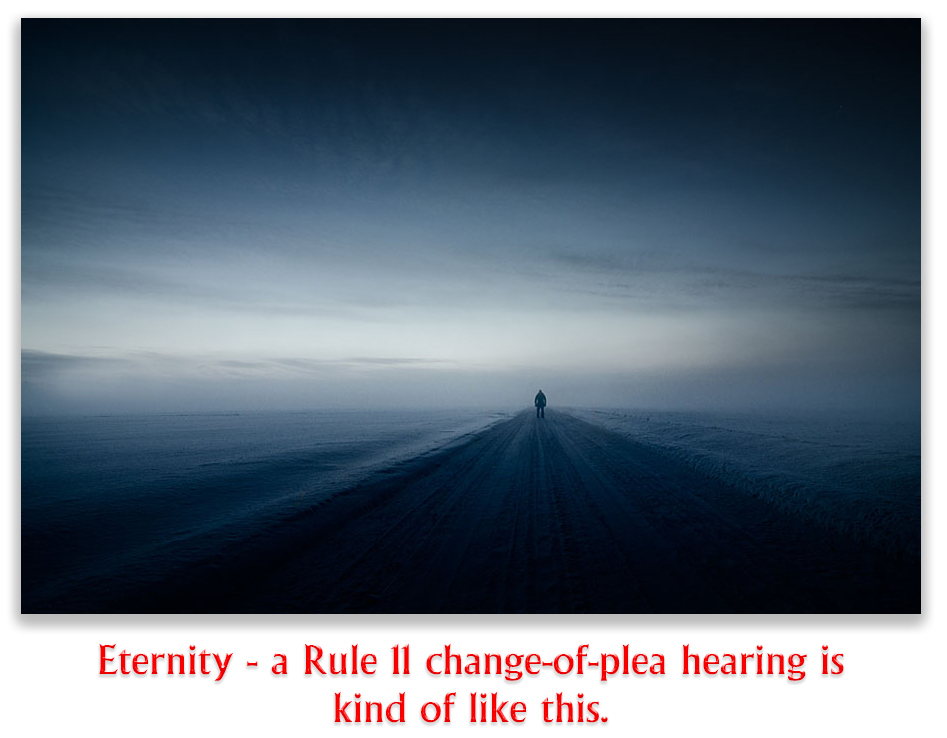We post news and comment on federal criminal justice issues, focused primarily on trial and post-conviction matters, legislative initiatives, and sentencing issues.

4TH CIRCUIT HOLDS LIKELY ACCA SENTENCE MUST BE MENTIONED AT PLEA HEARING
A week ago last Friday, the 4th Circuit ruled that a defendant in a felon-in-possession-of-a-firearm case (18 USC § 922(g)(1)) must be told of the risk that he or she will receive a mandatory minimum 15-year sentence under the Armed Career Criminal Act (18 USC § 924(e)) at the time the guilty plea is entered.
 Anyone is entitled to plead guilty, and a lot of people do. In fact, something like 97% of all federal defendants enter guilty pleas. That could be because of the superior law enforcement work done in ensuring that only guilty people ever get indicted. Of course, it could be that the system is rigged so that most of the time, the only rational course for a defendant to pursue is to admit to whatever the government has charged him or her with, in order to save a spouse from indictment, to secure a sentence that offers some chance of release in a reasonable time frame, or just to get out of jail and into a prison setting which is sweeter than county lockup.
Anyone is entitled to plead guilty, and a lot of people do. In fact, something like 97% of all federal defendants enter guilty pleas. That could be because of the superior law enforcement work done in ensuring that only guilty people ever get indicted. Of course, it could be that the system is rigged so that most of the time, the only rational course for a defendant to pursue is to admit to whatever the government has charged him or her with, in order to save a spouse from indictment, to secure a sentence that offers some chance of release in a reasonable time frame, or just to get out of jail and into a prison setting which is sweeter than county lockup.
Nevertheless, when a defendant enters a guilty plea, he or she gives up a panoply of constitutional rights, such as right to a trial by jury, a right to confront the accusers, the right to present evidence, the right to be found guilty only beyond a reasonable doubt. For that reason, due process and Rule 11 of the Federal Rules of Criminal Procedure require that a guilty plea be entered with the defendant aware of those rights, aware of the contents of any written plea agreement, and aware of the maximum penalty he or she faces.
 Jesmene Lockhart pled guilty without a plea agreement to a single § 922(g)(1) count. During a Rule 11 change-of-plea hearing (which is a lengthy formal proceeding at which the defendant changes the “not guilty” plea into a “guilty” plea), the magistrate judge asked the government to “summarize the charge and the penalty.” The government said the “maximum penalty” Jesmene faced was 10 years.
Jesmene Lockhart pled guilty without a plea agreement to a single § 922(g)(1) count. During a Rule 11 change-of-plea hearing (which is a lengthy formal proceeding at which the defendant changes the “not guilty” plea into a “guilty” plea), the magistrate judge asked the government to “summarize the charge and the penalty.” The government said the “maximum penalty” Jesmene faced was 10 years.
This was technically correct: at that time, everyone was reading the sentencing statute, 18 USC § 924(a)(2), which specified a maximum sentence of 10 years. No one was considering whether Jesmene had prior convictions that might result in his getting a 15-year mandatory minimum ACCA sentence under § 924(e).
But as the parties prepared for sentencing, the presentence report writer uncovered Jesmene’s prior convictions, and noticed the parties that he was eligible for the ACCA 14-year mandatory minimum sentence. Jesmene fought the ACCA designation, arguing that the convictions were too remote (he had been 16 years old), too close in time to one another, and statutorily exempt. Nothing worked.
What Jesmene did not try to do was to withdraw his guilty plea on the grounds it was not knowing and voluntary, because has was not told he could get an ACCA sentence. On appeal, even under the tougher “plain error” standard (because his trial court lawyer had not raised the issue), Jesmene claimed his guilty plea was involuntary because he had not been told about the possible ACCA sentence. He contended the benefit he gained from pleading guilty – a reduction from the bottom of his ACCA guideline range of 188 months to 180 months – was “so small as to be virtually non-existent.” Had he known about the risk of an ACCA sentence and how little a plea deal would help him, Jesmene contended, he would have had strong incentive to go to trial to try to avoid the 15-year ACCA sentence altogether.
 In a January 10 en banc opinion, the 4th Circuit held that Jesmene had met the plain error standard: the failure to inform him of the ACCA sentence at the change-of-plea was an error, it was plain, it affected his substantial rights, and “the error seriously affects the fairness, integrity or public reputation of judicial proceedings.” The Circuit cited national statistics that felon-in-possession defendants only go to trial 3% of the time, but ACCA defendants choose trial 13.5% of the time, and noted that the difference in Jesmene’s guidelines as a non-ACCA defendant and under the ACCA was 125 months. Plus, his very old criminal history (three burglaries within a short time span when he was 16 years old) suggested that Jesmene, being unaware of the ACCA risk, would reasonably have expected to be sentenced at the bottom of his 46-57 month advisory guideline range. By contrast, the only benefit he got from pleading guilty to an ACCA was an 8-month break for acceptance of responsibility.
In a January 10 en banc opinion, the 4th Circuit held that Jesmene had met the plain error standard: the failure to inform him of the ACCA sentence at the change-of-plea was an error, it was plain, it affected his substantial rights, and “the error seriously affects the fairness, integrity or public reputation of judicial proceedings.” The Circuit cited national statistics that felon-in-possession defendants only go to trial 3% of the time, but ACCA defendants choose trial 13.5% of the time, and noted that the difference in Jesmene’s guidelines as a non-ACCA defendant and under the ACCA was 125 months. Plus, his very old criminal history (three burglaries within a short time span when he was 16 years old) suggested that Jesmene, being unaware of the ACCA risk, would reasonably have expected to be sentenced at the bottom of his 46-57 month advisory guideline range. By contrast, the only benefit he got from pleading guilty to an ACCA was an 8-month break for acceptance of responsibility.
The 4th said, “the magistrate judge’s failure to inform Lockhart of the correct sentencing range was an obvious and significant mistake. Such an error undermines the very purpose of Rule 11 that a defendant be fully informed of the nature of the charges against him and of the consequences of his guilty plea… As a result of this error, Lockhart had every reason to think after the plea hearing that he would receive a sentence within the stated statutory range of between zero and 120 months’ imprisonment…”
United States v. Lockhart, 2020 U.S. App. LEXIS 822 (4th Cir. Jan 10, 2020)
– Thomas L. Root

